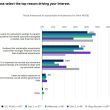As the global climate and biodiversity crises escalate—bringing with them rising temperatures, ecosystem degradation, and socio-economic disruption—the call for greater corporate accountability has grown more urgent. In response, the GRI Academy, a leading global platform for sustainability reporting education, has unveiled two new courses aimed at equipping professionals with advanced skills in climate and nature-related disclosures.
The first course, Climate Reporting with GRI and IFRS Standards, provides in-depth training on the GRI 102 Climate Change Standard and the IFRS Sustainability Disclosure Standards. It underscores the importance of a holistic approach to climate reporting that extends beyond emissions to encompass human and biodiversity dimensions. The course covers greenhouse gas disclosure, transition planning, and adaptation strategies, stressing that reporting on climate risks alone is no longer adequate.
The second course, GRI-TNFD Interoperability: A Guide for Nature-Related Reporting, focuses on nature-related disclosures. It introduces participants to interoperability mapping—a new tool that aligns the GRI Standards with the Taskforce on Nature-related Financial Disclosures (TNFD) framework. The course aims to help organisations respond to increasing stakeholder expectations for biodiversity transparency by simplifying and integrating nature-related reporting.
“These courses are designed to strengthen the knowledge base of sustainability practitioners and corporate reporters at a time when global challenges demand greater transparency and impact measurement,” said Paul Broekhof, GRI’s Director of Education. “We are proud to offer learning tools that will not only enhance careers but also help organisations better navigate their responsibilities in the face of accelerating climate and nature risks.”
The GRI Academy’s new offerings come amid mounting global scrutiny of environmental performance and a growing emphasis on nature-positive and net-zero transitions.














